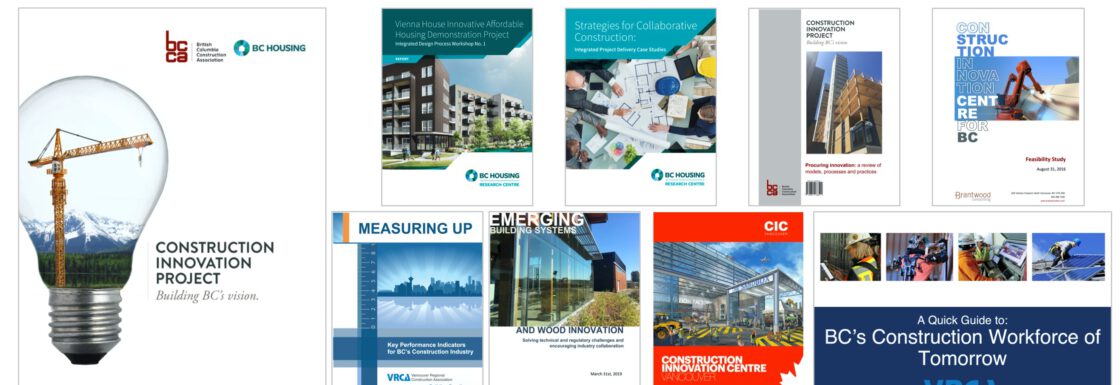Construction Innovation Project: Scius Advisory, BC Housing & BC Construction Association

Projects Sponsor
The ground-breaking Construction Innovation Project brought construction industry and government leaders together for the first time to envisage what the future of construction might look like. Supported by the BC Construction Association and BC Housing, the findings serve as a blueprint for a series of focused initiatives to address productivity challenges, build capacity and develop a construction technology ecosystem in British Columbia. Today, BC leads the country in zero emission buildings, mass timber and in GHG reductions from the construction process itself.
Canada’s construction industry employs 1.4 million Canadians––more than the next three largest industries combined. It is the 5th largest such sector in the world and an area where Canada has a strong competitive edge. It’s also a sector with considerable growth opportunities. Indeed the global construction market is forecast to grow by over 70% by 2025.
It all sounds pretty glowing until you remember that the building sector (factoring in building operations at 28% and embodied carbon of building materials at 11%) is the world’s single largest contributor to global warming. But the fact is, it’s certainly not all bad news.
The potential impact of making positive changes within such a vast industry are almost incalculable, and that’s where Scius Advisory’s Construction Innovation Project – A Vision for BC enters the site plan. The Scius team, helmed by Helen Goodland, Founding principal and Head of Research and Innovation at Scius Advisory Inc, brought construction industry and government leaders together for the first time to envisage what the future of construction might look like.
The construction industry as a whole is highly inefficient – over 50% of a typical construction project (time and cost) is “non-value-add” (i.e. waste). It is also one of the least diverse (4% of skilled trade workers are women) and is one of the least safe, with one in every twenty five workers getting injured every year. All these facts together point to an industry that must be modernized if climate goals are going to be realized.
Indeed the persistent labour shortage facing the sector–––two thirds of BC’s skilled trade workers are over the age of forty-four––was one catalyst for construction businesses participation in the Construction Innovation Project. There is an understanding that if construction companies hope to attract the workforce of tomorrow, revamping their image needs to be part of the plan.
Many construction companies, however, are unfamiliar with how to engage with that kind of innovation. In an entirely project driven sector where margins are slim, some quite naturally view investment in innovation as a cost and/or risk that would need to be expensed to a particular project as opposed to a strategic investment in their business as a whole.
The Construction Innovation Project set about getting the various stakeholders in BC’s construction industry talking. What was needed was a cohesive voice able to articulate what innovation meant to the construction industry––what it included, its value and, if properly implemented, what it could do to transform the sector.
Starting in 2014, under the guidance of Ms. Goodland, the BC Construction Association established a Construction Innovation Committee. Eight general and trade contracting business leaders, owners and researchers stepped up to help frame the research plan, develop the funding proposal to BC Housing, gather 30 letters of support from key organizations and provide overall project oversight.
The primary research included sixteen “thought-leader” interviews, three focus groups, and an on-line survey which ran from early July to the end of September 2015. The survey respondents came from all corners of the province and from seventeen different types of contracting and trade firms, consultancies, government agencies, and related businesses.
Secondary research comprised a comprehensive review of publicly available economic, labour market, and industry data. The project team conducted a scan of over thirty best practices from other jurisdictions. They also reviewed BC’s construction innovation capabilities through the assembly of a database of R&D centres, large firms, training programs, investors, incentive programs, policies and regulations, and relevant award programs. An in-depth evaluation of the progress and success of three construction industry innovation strategies that have been completed in Australia, the UK and Scotland was also conducted.
All this research revealed a wealth of rich data and insights about the state of BC’s construction industry and its relationship with innovation. Building on BC’s strengths of expertise in green building and wood design and construction, the presence of a number of innovation “champions” and a track record of “being the first” in Canada, the report outlined an agenda for strengthening the BC construction industry by enabling innovation starting with three key initiatives: 1) Creating an action-oriented Innovation Council, 2) Developing a formal Construction Innovation Action Plan and 3) Launching an Innovation Procurement Initiative.
The research was updated in 2019 with a “Measuring Up” report that benchmarks industry-level performance and progress to date on key innovation measures such as GHG emission reduction, productivity, diversity, etc. conducted by the Vancouver Regional Construction Association. A video of the project was released by BC Housing in 2020.
BC leads the country in the adoption of zero emission building policies, mass timber systems and in the reduction of GHGs from the construction process itself, which has seen a reduction by a full twenty-five percent between 2007 and 2017 while, at the same time, increasing its contribution to BC’s GDP by three and a half billion dollars, for a twenty-three percent increase.
The impacts of this project continue to resonate through the construction industry and have given industry advocates the language, rationale and tools to engage with innovation.
As towering a success as Scius Advisory’s Construction Innovation Project is, it’s best viewed as a foundation, or a blueprint for what is yet to be.













